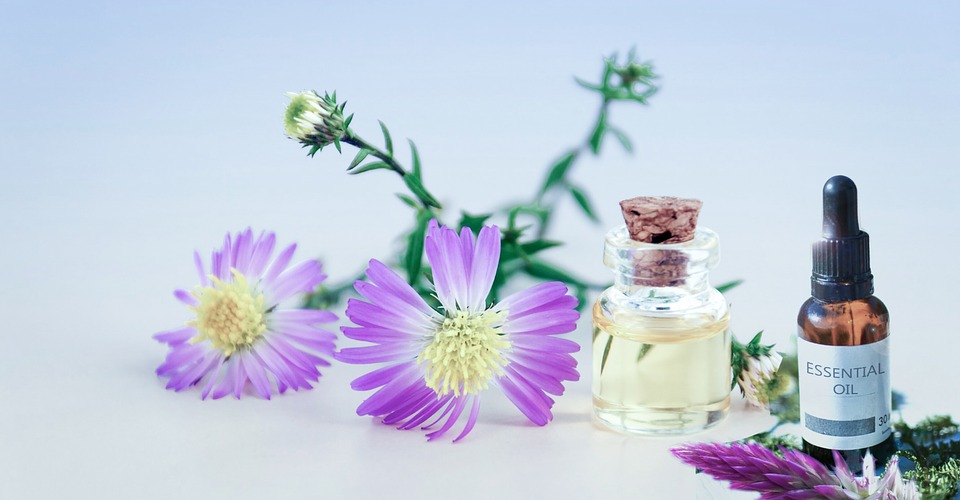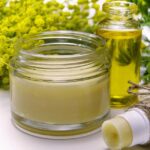If you’re an avid reader of the blog, you’ll know that a lot of people are turning towards more holistic and natural methods of healing eczema. Essential oils should be an essential part of your eczema holistic healing toolkit!
Given that eczema is a chronic, lifelong condition, finding an effective treatment and management plan can be a long and frustrating process. But a lot of people find that natural treatments and ingredients can be helpful.
Essential oil therapy is becoming more and more popular as an alternative form of treatment because it can help reduce anxiety and deal with common triggers.
First of all, what the heck are essential oils?
Essential oils are simply compounds that are extracted from plants. According to dietitian Helen West, the reason that they’re called “essential oils” is because the oils capture the plant’s scent and flavor, also known as the plant’s “essence.” West also explains that essential oils can be extracted from the plant through distillation (think steam) or mechanical methods like cold pressing. Essential oils can also be extracted via chemical processes, but these types of oils are not pure essential oils. West also notes that essential oils have to be combined with a carrier oil before they’re ready to be used. A carrier oil can be almond oil, jojoba oil, coconut oil, olive oil, etc.
Essential oils are a popular alternative treatment for a wide range of dermatological problems, such as infections, general skin care, and inflammatory skin problems like eczema, even though there isn’t scientific agreement on how well they work.
Using essential oils topically.
Essential oils can be applied topically to treat eczema. First, essential oils can be pretty potent so less is more! It’s like cooking; you can always add more later, but you can’t take it away.
Not all essential oils are safe or effective for treating eczema, which can cause sensitive skin that reacts to fragrances and other things that irritate it.
Before putting essential oils on your skin, you should usually mix them with a carrier oil. You can also use aromatherapy or a diffuser to inhale them, which may help with stress and anxiety that can cause flare-ups.
However, some essential oils have minerals and nutrients that can help heal and control the symptoms of eczema.
You’ll want to avoid using them in sensitive areas. Start applying them topically on your face, forehead, neck, temples, legs, arms, abdomen, chest, feet, etc. Stay away from your eyes, ears, nose, and other sensitive areas.
Which essential oils are best for eczema?
Now that we understand what essential oils are and how to apply them topically, which essential oils should you choose? Below are some of the most common essential oils for eczema!
Lavender Oil
Lavender oil is the most commonly used essential oil for treating eczema and other skin conditions. This essential oil is mostly known for its anti-inflammatory properties but is also well known for its pain management properties. It can also be used to restore the skin’s complexion and help heal wounds. More specifically for eczema, it can help alleviate itchiness!
Tea Tree Oil
Tea tree oil can be very effective for those with eczema because it’s known for its regenerative properties. Eczema is harsh on the skin; this is one method for healing eczema-caused broken and irritated skin! Some people may find tea tree oil irritating if they put it on their skin directly, so it is best to mix it with a carrier oil or use it in a product like a hand soap.
Another interesting property of tea tree oil is that it’s an antiseptic! This can help prevent infections that often come along with excessive itching. Like other essential oils, it is believed that tea tree oil has qualities that make it anti-inflammatory as well as antibacterial and antifungal.
Frankincense
Frankincense essential oil is made from the sap of the Boswellia tree, which is called resin. This is found in the Middle East and Africa. It has been used for hundreds of years, and it is believed to be good for reducing inflammation.
Frankincense may be good for treating bruises and sores, and when mixed with a carrier oil, it may help calm skin that is red and itchy. It can be used in a diffuser as an essential oil to help you relax because it smells like wood. You can use a few drops to help with peace, harmony, and meditation.
This oil can also be used as a massage oil. Frankincense is safe to put on the skin and to take orally in a capsule, medicine, or water.
Sandalwood Oil
Sandalwood oil is mostly known for its moisturizing properties, but like lavender oil, it is also effective for inflammation and itchiness. Some people even use sandalwood oil to help calm nerves, reduce stress, and promote relaxation, which is also important for those with eczema!
Ylang Ylang Oil Don’t let the name turn you away because it’s hard to pronounce! Ylang ylang oil is also known for its anti-inflammatory properties, but it’s mostly known for its antiseptic properties! Another good essential oil to have in your toolbox to prevent infection.
Carrier Oils That Work
Carrier oils are natural oils that don’t have a scent. They are an important part of essential oil treatments because they can dilute the essential oils so they can be applied to the skin more safely.
When an essential oil is mixed with a carrier oil, the carrier oil “carries” the essential oil into the skin. This lets the essential oil soak in instead of evaporating quickly.
Sunflower Oil
Sunflower seed oil is anti-inflammatory and contains vitamin E, both of which can help with skin that is itchy or inflamed and can also help the skin keep moisture.
Coconut Oil
Coconut oil has been used as a moisturizer for hundreds of years. Some reports say that the oil can kill bacteria and other germs. This is mostly because of how much lauric acid it has. Lauric acid is the main fatty acid in coconut oil, so this makes sense. Studies show that virgin coconut oil is a better carrier oil for essential oils in people with atopic dermatitis than other oils made from minerals.
Jojoba Oil
Jojoba oil, technically a wax, is frequently used for massaging purposes. Because of its anti-inflammatory effects, it may also be useful in treating skin disorders like acne. Vitamin E, vitamin C, and zinc are abundant in it naturally, and all three help in skin repair.
It absorbs well in aromatherapy and might be a good choice for people with oily or acne-prone skin. Jojoba oil is a way to keep your skin moist. It comes from the seeds of the jojoba plant, which grows in dry places like Mexico and the south of the United States.
References
West, H. (2017, May 30). What Are Essential Oils and Do They Work? Retrieved from https://www.healthline.com/nutrition/what-are-essential-oils


